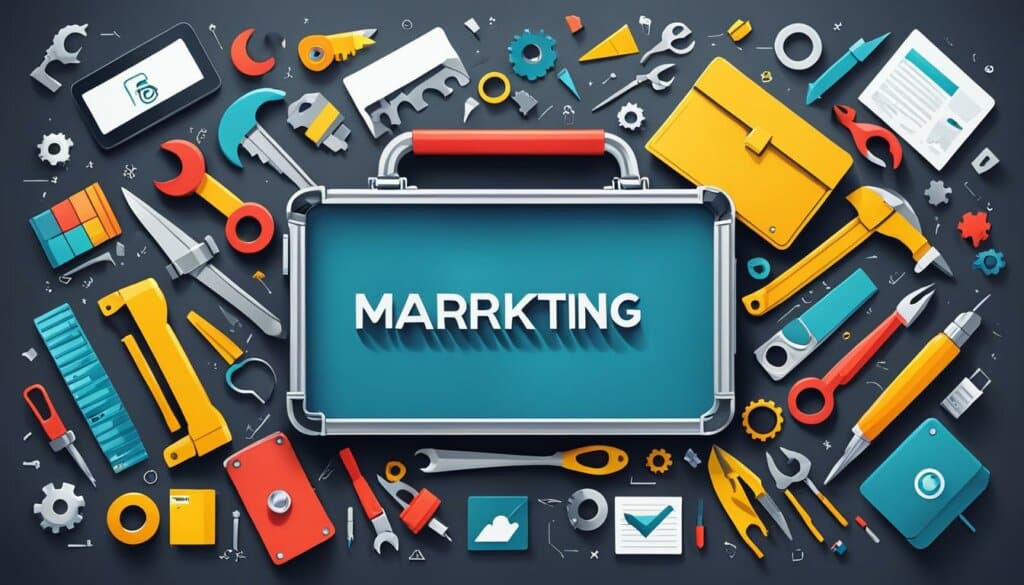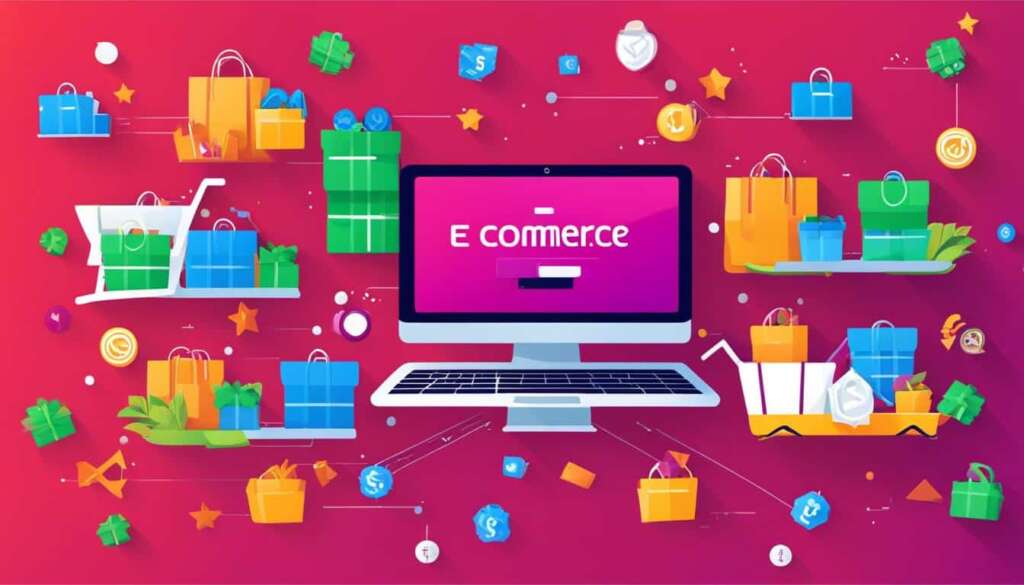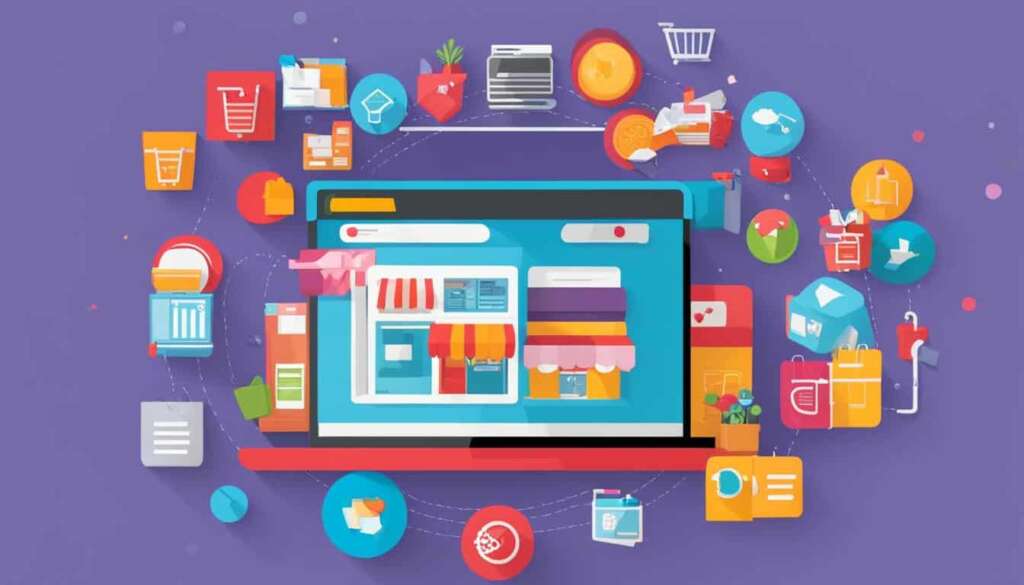Table of Contents
E-commerce marketing is a vital component of succeeding in the online business world. To effectively navigate the digital landscape, entrepreneurs must have a solid understanding of e-commerce marketing strategies and tactics. In this article, we will explore the fundamental concepts of e-commerce marketing, including the conversion funnel, various e-commerce business models, and the top e-commerce platforms available.
Before delving into the specifics, it’s crucial to grasp the concept of the conversion funnel. The conversion funnel represents the journey a shopper takes from discovering a brand to making a purchase. It consists of multiple stages, such as awareness, consideration, and conversion. E-commerce marketing encompasses activities that guide shoppers through each stage of the funnel.
Furthermore, understanding different e-commerce business models is essential for online success. There are four common models: Business to Consumer (B2C), Business to Business (B2B), Consumer to Consumer (C2C), and Consumer to Business (C2B). Each model requires unique marketing approaches tailored to its target audience and objectives.
When setting up an online store, selecting a reliable e-commerce platform is crucial. These platforms provide the necessary tools to manage inventory, set pricing, and run promotions. Popular e-commerce platforms include Shopify, WooCommerce, BigCommerce, Magento, Wix, and Squarespace. Choosing the right platform ensures a seamless shopping experience for customers.
By grasping these e-commerce marketing essentials and strategies, entrepreneurs can drive traffic, increase conversions, and achieve long-term growth in the online business landscape. Let’s dive into the details and explore how to create an effective e-commerce marketing strategy.
What Is E-commerce?
E-commerce, short for electronic commerce, is the process of buying and selling products or services online. It encompasses not only online shopping stores but also various other forms of online transactions, such as online auctions, subscription-based businesses, sales of digital products, crowdfunding platforms, and online marketplaces.
| Business Models | Description |
|---|---|
| Business to Consumer (B2C) | The B2C model involves businesses selling products or services directly to consumers through online platforms. |
| Business to Business (B2B) | The B2B model focuses on businesses selling products or services to other businesses through dedicated B2B online platforms. |
| Consumer to Consumer (C2C) | The C2C model enables individuals to sell products or services to other individuals through online platforms, acting as intermediaries. |
| Consumer to Business (C2B) | The C2B model involves individuals offering products or services to businesses. |
The emergence of e-commerce has revolutionized the way people shop and conduct business. It provides convenience, accessibility, and a global marketplace for both buyers and sellers. With more businesses and consumers venturing into the online realm, understanding e-commerce and its various business models is essential for success in the digital age.
What Is an E-commerce Platform?
An e-commerce platform is a software application that allows businesses to set up and manage an online store. It provides the necessary tools for marketing and selling products, managing inventory, setting pricing, and running promotions.
E-commerce platforms can be on-premise or cloud-based, with most small and medium-sized businesses preferring the latter for its affordability and scalability.
Popular e-commerce platforms include Shopify, WooCommerce, BigCommerce, Magento, Wix, and Squarespace.
Key Features and Benefits of E-commerce Platforms
- Online Store: E-commerce platforms allow businesses to create and customize their online stores, making it easy for customers to browse and purchase products.
- Manage Inventory: These platforms provide inventory management tools to keep track of product stock, manage variants and SKUs, and set reordering thresholds.
- Marketing Tools: E-commerce platforms offer marketing features such as SEO optimization, social media integration, email marketing, and analytics to help businesses attract and engage customers.
- Payment Processors: They integrate with various payment gateways, enabling secure and convenient transactions for customers.
- Mobile-Friendly: E-commerce platforms ensure a responsive design, allowing customers to shop seamlessly from their mobile devices.
- Scalability: Cloud-based e-commerce platforms offer scalability, allowing businesses to easily accommodate growth and handle high traffic volumes.
| E-commerce Platform | Key Features | Pricing |
|---|---|---|
| Shopify | Easy to use, extensive app store, responsive themes | Multiple pricing plans starting from $29/month |
| WooCommerce | Flexible, customizable, seamless integration with WordPress | Free plugin, additional costs for hosting and extensions |
| BigCommerce | Powerful built-in features, excellent scalability, omnichannel support | Pricing starts at $29.95/month |
| Magento | Highly customizable, robust open-source platform, extensive feature set | Open-source (free) or enterprise pricing |
| Wix | Drag-and-drop website builder, beginner-friendly, AI-powered tools | Multiple pricing plans starting from $23/month |
| Squarespace | Sleek templates, integrated blogging platform, seamless design customization | Multiple pricing plans starting from $12/month |
5 Steps to Document an E-Commerce Marketing Plan
Developing an effective e-commerce marketing strategy begins with a well-documented marketing plan. By following these five steps, you can create a comprehensive e-commerce marketing plan that sets clear goals, identifies the target audience, and determines the right strategies and tactics for success.
Step 1: Define Goals and Objectives
Start by clearly defining the goals and objectives of your e-commerce store. Consider what you hope to achieve through your marketing efforts, such as increasing sales, expanding customer base, or improving brand awareness. Set specific and measurable goals that align with your overall business objectives.
Step 2: Assess the Target Audience and Competition
Next, conduct thorough research to understand your target audience and competition. Identify your ideal customers, their demographics, preferences, and buying behaviors. Analyze your competitors’ marketing strategies to gain insights into what works and what doesn’t in your industry. Use this information to tailor your marketing plan to effectively reach your target audience and differentiate yourself from competitors.
Step 3: Determine Marketing Strategies and Tactics
Based on your goals, target audience, and competition analysis, determine the most suitable marketing strategies and tactics for your e-commerce store. Consider various channels such as search engine optimization (SEO), content marketing, social media advertising, email marketing, influencer partnerships, and paid search advertising. Choose strategies that align with your target audience’s preferences and behaviors, and that provide the best return on investment (ROI).
Step 4: Build a Martech Stack
In today’s digital landscape, utilizing marketing technology (martech) is essential for effective e-commerce marketing. Build a martech stack by selecting and implementing the right tools and platforms for your e-commerce store. This can include customer relationship management (CRM) software, email marketing platforms, analytics tools, social media management tools, and marketing automation solutions. Integrate these tools to streamline your marketing activities, optimize workflows, and enhance the customer experience.
Step 5: Outline Metrics for Measuring Success
Lastly, define key performance indicators (KPIs) and metrics that will help you measure the success of your marketing efforts. This can include metrics such as website traffic, conversion rates, average order value, customer acquisition cost, and customer lifetime value. Regularly review and analyze these metrics to evaluate the effectiveness of your e-commerce marketing plan and make data-driven optimizations.

By following these five steps and implementing a well-documented e-commerce marketing plan, you can effectively reach your target audience, achieve your goals and objectives, and drive success for your online store.
E-commerce Marketing Strategies
E-commerce marketing strategies encompass a range of activities aimed at attracting customers and driving conversions. By implementing these strategies, businesses can effectively promote their online stores and engage with their target audience. Here are some effective e-commerce marketing strategies:
- Creating Original and Engaging Content: Developing high-quality and valuable content that resonates with the target audience is essential in attracting and engaging customers. This can include blog posts, product guides, videos, and infographics.
- Implementing Content Marketing: Content marketing is a strategy that focuses on creating and distributing relevant content to attract and educate customers. By providing valuable information, businesses can position themselves as trusted experts in their industry.
- Leveraging Social Media Platforms: Social media platforms provide an excellent opportunity to promote products, engage with customers, and build brand awareness. By utilizing social media marketing techniques, businesses can reach a wider audience and establish a strong online presence.
- Utilizing Email Marketing Campaigns: Email marketing is a highly effective strategy for communicating with customers, nurturing leads, and encouraging repeat purchases. By sending targeted and personalized email campaigns, businesses can build strong relationships with their customers.
- Optimizing for Search Engines (SEO): Implementing search engine optimization (SEO) techniques helps improve a website’s visibility on search engine results pages. By optimizing keywords, meta tags, and content structure, businesses can attract organic traffic and increase conversions.
- Running Pay-per-click (PPC) Ad Campaigns: Pay-per-click advertising allows businesses to display targeted ads to potential customers. By bidding on relevant keywords, businesses can reach their target audience and drive traffic to their website.
- Offering Personalized Customer Experiences: Personalization is becoming increasingly important in e-commerce marketing. By leveraging customer data and implementing personalization strategies, businesses can enhance customer satisfaction and increase conversions.
By implementing these e-commerce marketing strategies, businesses can effectively promote their products, engage with their target audience, and drive conversions.
Why Content Marketing Matters
“Content marketing is not just about creating content; it’s about creating value for your customers. It is the foundation of any successful e-commerce marketing strategy, as it helps establish trust, educate customers, and drive conversions.” – Jane Miller, Content Marketing Expert
E-commerce Marketing Tools
When it comes to e-commerce marketing, having the right tools can make all the difference in driving success. From optimizing search engine rankings to streamlining marketing activities, these tools empower businesses to maximize their online presence and enhance customer engagement. In this section, we will explore some essential e-commerce marketing tools that can supercharge your marketing efforts and help you achieve your business goals.
SEO Tools for Keyword Research and Optimization
Effective search engine optimization (SEO) is vital for increasing organic visibility and attracting targeted traffic to your e-commerce store. SEO tools provide valuable insights into keyword research, competition analysis, and content optimization. With these tools, you can identify high-ranking keywords, optimize your website’s architecture, and monitor your performance on search engines. Popular SEO tools include SEMrush, Ahrefs, Moz, and Google Keyword Planner.
Marketing Automation Platforms for Streamlining Marketing Activities
Marketing automation platforms simplify and automate repetitive marketing tasks, enabling you to focus on strategic initiatives. These tools help in managing customer journeys, segmenting audiences, personalizing communication, and automating email campaigns. By leveraging marketing automation, you can efficiently nurture leads, increase conversions, and drive customer loyalty. Leading marketing automation platforms include HubSpot, Marketo, Pardot, and ActiveCampaign.
Customer Relationship Management (CRM) Software for Managing Customer Data and Interactions
CRM software is a valuable asset for e-commerce businesses as it enables efficient customer management and personalized interactions. These tools centralize customer data, provide insights into customer behavior, and facilitate seamless communication across multiple channels. With CRM software, you can track customer interactions, deliver personalized experiences, and build long-lasting customer relationships. Popular CRM tools include Salesforce, Zoho CRM, Microsoft Dynamics 365, and HubSpot CRM.
Email Marketing Tools for Sending Targeted Campaigns
Email marketing remains one of the most effective ways to engage with your customers and drive sales. Email marketing tools enable you to create professional-looking emails, segment your audience, and track campaign performance. With these tools, you can send personalized and targeted emails, automate drip campaigns, and analyze email metrics to optimize your campaigns. Popular email marketing tools include Mailchimp, Constant Contact, SendinBlue, and Campaign Monitor.
Analytics Tools for Tracking and Measuring Performance
Tracking and measuring the performance of your e-commerce marketing efforts is crucial for making data-driven decisions and optimizing your strategies. Analytics tools provide valuable insights into website traffic, conversion rates, customer behavior, and campaign performance. By leveraging analytics tools, you can identify areas of improvement, optimize your marketing tactics, and drive better business outcomes. Popular analytics tools include Google Analytics, Adobe Analytics, Mixpanel, and Hotjar.
Social Media Management Tools for Scheduling and Monitoring Social Media Posts
Social media plays a significant role in e-commerce marketing, allowing you to reach a wider audience and engage with your customers. Social media management tools simplify the process of scheduling, publishing, and monitoring your social media posts across different platforms. With these tools, you can maintain a consistent brand presence, analyze engagement metrics, and streamline your social media marketing efforts. Popular social media management tools include Hootsuite, Buffer, Sprout Social, and Later.
Advertising Platforms for Running PPC Campaigns
Pay-per-click (PPC) advertising can be a powerful way to drive targeted traffic to your e-commerce store and increase conversions. Advertising platforms provide the infrastructure to create and manage PPC campaigns across various channels, such as search engines and social media. With these platforms, you can set budgets, target specific demographics, optimize ads, and track campaign performance. Popular advertising platforms include Google Ads, Facebook Ads, Instagram Ads, and Microsoft Advertising.
By leveraging the right e-commerce marketing tools, you can optimize your online presence, enhance customer engagement, and drive business growth. These tools empower you to make data-driven decisions, automate marketing activities, and deliver personalized experiences to your customers. Invest in the tools that align with your business goals and strategies, and stay ahead in the competitive e-commerce landscape.

E-commerce Marketing Tactics
In addition to strategies, there are specific tactics that can enhance your e-commerce marketing efforts. These tactics are designed to optimize conversions, increase customer engagement, and expand your reach. By implementing the right tactics, you can effectively promote your online store and drive sales.
1. Influencer Marketing
One powerful tactic is running influencer marketing campaigns. By partnering with social media influencers who have a strong following in your niche, you can leverage their influence to promote your products or services. This increases brand awareness, builds credibility, and drives targeted traffic to your store. Be sure to choose influencers whose values align with your brand and who have an engaged and relevant audience.
2. Selling on Popular Marketplaces
Expanding your reach beyond your own online store is another effective tactic. Selling your products on popular marketplaces like Amazon and eBay allows you to tap into their large customer base and reach a wider audience. This not only increases your sales potential but also enhances brand visibility. Ensure that your product listings are well optimized and that you provide excellent customer service to stand out from the competition.
3. Email Campaigns
Email marketing campaigns continue to be an impactful tactic for e-commerce businesses. By building an email list of customers and prospects, you can engage with them on a regular basis, promote new products or offers, and drive repeat purchases. Personalize your emails, segment your audience, and create compelling content to maximize the effectiveness of your email campaigns. Don’t forget to optimize your emails for mobile devices, as many customers now access their emails on smartphones and tablets.
4. Upselling and Cross-selling
Increasing the average order value is essential for maximizing revenue. Implementing upselling and cross-selling techniques is a proven tactic to achieve this. Upselling involves offering customers a higher-end version of the product they are considering, while cross-selling suggests complementary or related products. By strategically placing these offers during the customer journey, you can entice customers to spend more and boost your overall sales.
5. Product Page Optimization
Your product pages play a vital role in converting visitors into customers. Optimizing these pages for higher conversions is an important e-commerce tactic. Focus on creating compelling product descriptions, high-quality images, clear calls-to-action, and customer reviews. Utilize persuasive copywriting techniques and visually appealing layouts to capture your customers’ attention and persuade them to make a purchase.
6. User-generated Content
Engaging your customers and building social proof is crucial for e-commerce success. Leveraging user-generated content is a powerful tactic to achieve this. Encourage your customers to share their experiences, reviews, and images of your products on social media. This not only increases brand awareness but also builds trust and credibility among potential customers. Share and showcase the best user-generated content on your website and social media channels to inspire others to engage with your brand.
By employing these e-commerce marketing tactics, you can optimize your marketing efforts, drive targeted traffic, boost sales, and build long-term customer relationships. Experiment with different tactics, analyze the results, and constantly refine your strategies to stay ahead in the competitive e-commerce landscape.
Conclusion
E-commerce marketing is essential for the success of any online business. Understanding the concept of e-commerce, different business models, top e-commerce platforms, and effective marketing strategies and tactics is crucial for entrepreneurs looking to propel their online ventures to new heights.
By documenting a comprehensive e-commerce marketing plan, businesses can lay the foundation for success. This plan should encompass defining clear goals and objectives, identifying the target audience, evaluating the competition, and outlining the marketing strategies and tactics to be employed.
To achieve online business success, it is important to utilize the right tools and resources. By leveraging e-commerce marketing tools such as SEO tools, marketing automation platforms, and analytics tools, businesses can streamline their marketing efforts and gain valuable insights into customer behavior.
Implementing various strategies and tactics is vital for creating awareness, driving traffic, converting visitors into paying customers, and achieving long-term growth and profitability. By embracing content marketing, social media engagement, email campaigns, influencer marketing, and optimization techniques, businesses can enhance their online visibility, engage their target audience, and foster strong customer relationships.
In conclusion, mastering e-commerce marketing essentials is key to online business success. By staying informed, leveraging the right tools, and implementing effective strategies, entrepreneurs can navigate the competitive online landscape, increase their brand’s reach, and achieve their business goals.
FAQ
What is e-commerce marketing?
E-commerce marketing refers to the activities aimed at guiding shoppers through the conversion funnel in online stores. It includes strategies and tactics to create awareness, drive traffic, and convert visitors into paying customers.
What is e-commerce?
E-commerce, short for electronic commerce, is the process of buying and selling products or services online. It encompasses online shopping stores as well as other forms of online transactions, such as online auctions, subscription-based businesses, sales of digital products, crowdfunding platforms, and online marketplaces.
What is an e-commerce platform?
An e-commerce platform is a software application that allows businesses to set up and manage an online store. It provides tools for marketing and selling products, managing inventory, setting pricing, and running promotions. Popular e-commerce platforms include Shopify, WooCommerce, BigCommerce, Magento, Wix, and Squarespace.
How do I create an e-commerce marketing plan?
To create an e-commerce marketing plan, you should document a comprehensive marketing plan that includes defining goals and objectives for your store, assessing the target audience and competition, determining marketing strategies and tactics, building a martech stack, and outlining metrics for measuring success.
What are some effective e-commerce marketing strategies?
Some effective e-commerce marketing strategies include creating original and engaging content, implementing content marketing to attract and educate customers, leveraging social media platforms for promotion and engagement, utilizing email marketing campaigns to communicate with customers, optimizing the website for search engines (SEO), and running pay-per-click (PPC) ad campaigns.
What tools are available for e-commerce marketing?
There are various tools available to support e-commerce marketing efforts, including SEO tools for keyword research and optimization, marketing automation platforms for streamlining marketing activities, customer relationship management (CRM) software for managing customer data and interactions, email marketing tools for sending targeted campaigns, analytics tools for tracking and measuring performance, social media management tools for scheduling and monitoring social media posts, and advertising platforms for running PPC campaigns.
What tactics can be employed for e-commerce marketing?
Some tactics that can be employed for e-commerce marketing include running influencer marketing campaigns, selling on popular marketplaces like Amazon and eBay, utilizing email marketing campaigns to engage and retain customers, implementing upselling and cross-selling techniques, optimizing product pages for higher conversions, and leveraging user-generated content for social proof and customer engagement.
Why is e-commerce marketing crucial for online business success?
E-commerce marketing is crucial for online business success because it enables businesses to create awareness, drive traffic, convert visitors into paying customers, and achieve long-term growth and profitability. By understanding e-commerce marketing essentials and implementing effective strategies and tactics, entrepreneurs can propel their online businesses to success.













